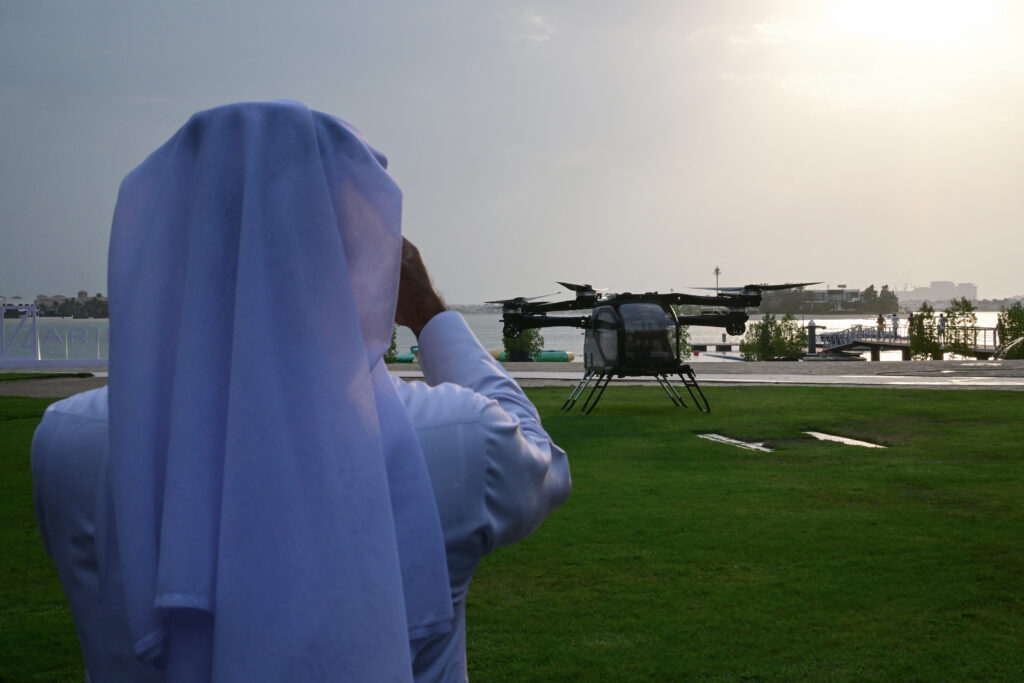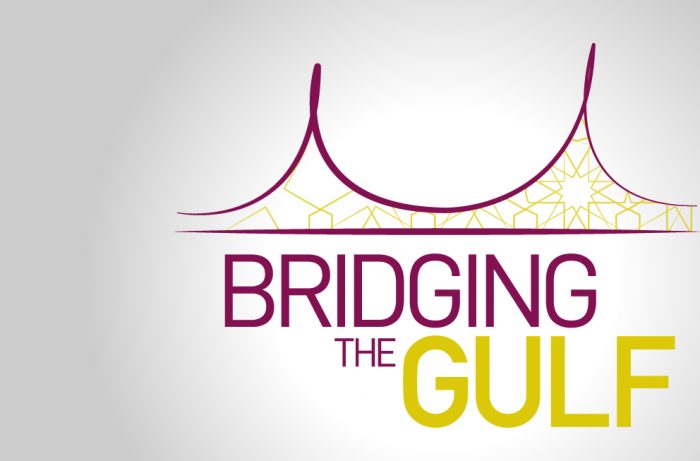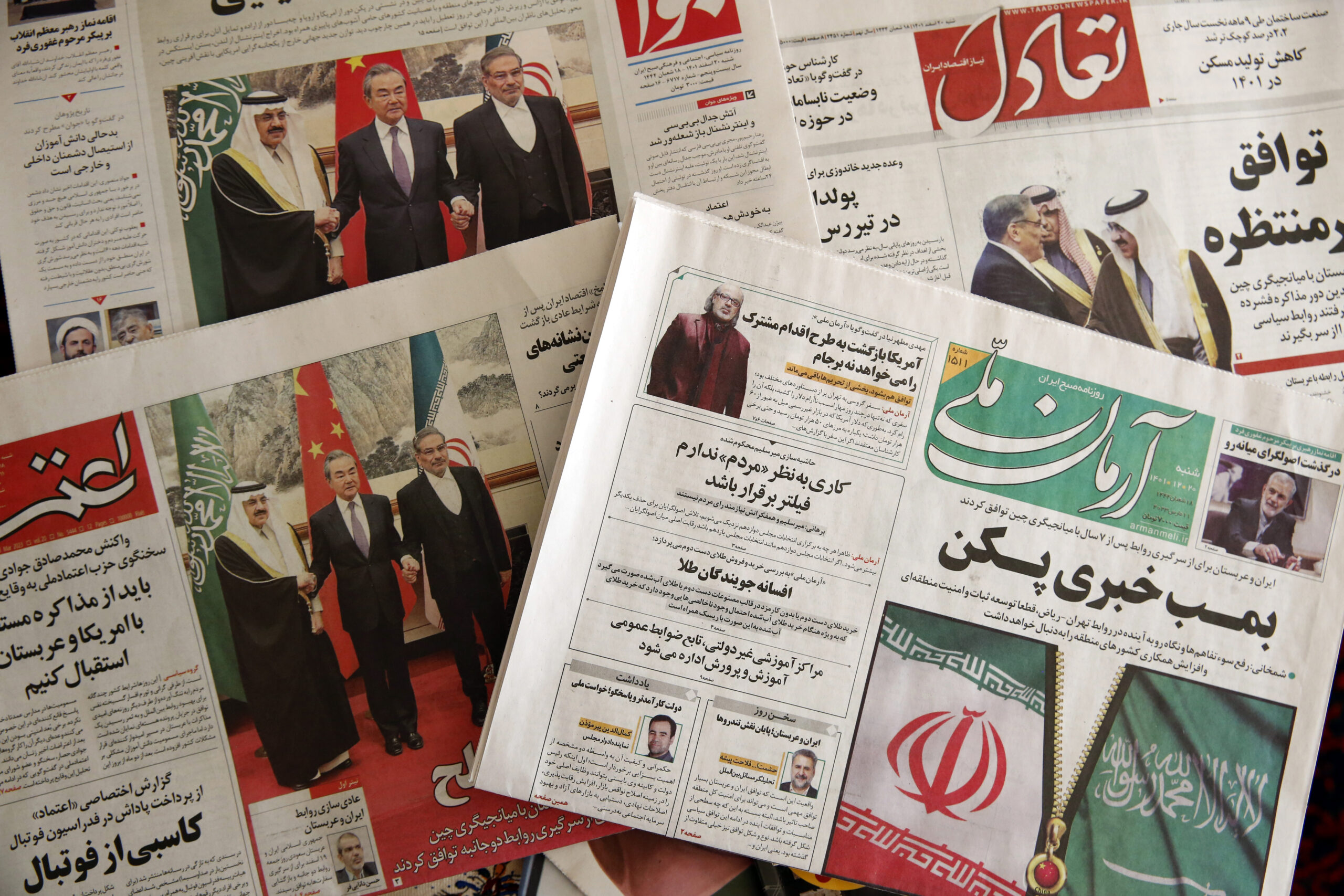
- 06 Apr 2023
China-Mediated Agreement between Saudi Arabia and Iran: A Remarkable Development?
(This event was organised by MEI Political Economy research cluster.)
The agreement between Saudi Arabia and Iran to restore their diplomatic ties is a significant development with potential to which will reverberate throughout the Middle East region and beyond. The next few months will be crucial to determining if the deal lives up to its promise, and whether China’s role is a reflection of its new clout in the region. This webinar examined the rationale of the three primary players in coming to an agreement, and what might be in store for the regional security architecture in future.
This public talk was conducted online via Zoom on Thursday, 6 April, from 5.00 pm to 6.00 pm SGT.
Listen to the podcast here:
Watch the webinar here:
Image caption : Newspapers in Tehran feature on their front page news about the China-brokered deal between Iran and Saudi Arabia to restore ties, signed in Beijing the previous day, on March, 11 2023. – Riyadh and Tehran announced on March 10 that after seven years of severed ties they would reopen embassies and missions within two months and implement security and economic cooperation agreements signed more than 20 years ago. (Photo by ATTA KENARE / AFP)
About the Speakers
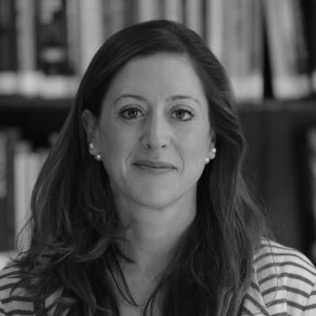
Deputy Director and Senior Research Fellow, Middle East and North Africa Programme
Chatham House
Dr Mohammed Alsulami
Founder and President of International Institute for Iranian Studies (RASANAH)
International Institute for Iranian Studies (RASANAH)
Dr Jean-Loup Samaan
Senior Research Fellow
Middle East Institute, National University of Singapore
[Moderator] Dr Aisha Al Sarihi
Research Fellow
Middle East Institute, National University of Singapore
Dr Sanam Vakil is the deputy director of the Middle East North Africa programme, where she leads project work on Iran and Gulf Arab dynamics.
Sanam’s research focuses on regional security, Gulf geopolitics, and on future trends in Iran’s domestic and foreign policy.
She is also the James Anderson professorial lecturer in the Middle East Studies department at the Johns Hopkins School of Advanced International Studies (SAIS Europe) in Bologna, Italy.
Before these appointments, Sanam was an assistant professor of Middle East Studies at SAIS Washington. She served as a research associate at the Council on Foreign Relations also providing research analysis to the World Bank’s Middle East and North Africa department.
Sanam is the author of Action and Reaction: Women and Politics in Iran (Bloomsbury 2013). She publishes analysis and comments for a variety of media and academic outlets.
Sanam received her BA in political science and history from Barnard College, Columbia University and her MA/PhD in international relations and international economics from Johns Hopkins University.
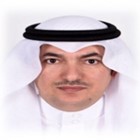
Dr Mohammed Alsulami is the founder and President of the international institute for Iranian Studies RASANAH, an independent think tank based in Riyadh. He’s also an associate professor of Iranian studies at Umm al-qura university. He received his Ph.D. from Leiden University in 2014. His Ph.D. investigated the notions of the other in modern Iranian thought. Also, he is interested in Iranian-Arab political, cultural and social relationships in the modern time. He speaks Arabic, English, and Persian.
Dr. Alsulami has presented at numerous regional and international conferences, as well as publishing widely in many peer-reviewed journals and edited many books such as “Iranian Journals in Berlin during the Interwar Period”, in Transnational Islam in Interwar Europe; Muslim Activists and Thinkers and “The Arab Omar Khayyam”, in The Great Umar Khayyam: A Global Reception of the Rubaiyat. He has single and co-authored several books such as Iran Supreme Leadership: Usurped Power: Shiite political controversy between Arab and Iranian religious authorities and The Arab Other in Modern Iranian Mentality.
He has acted as an advisor to many governmental and non-governmental organizations in Saudi Arabia. Since 2010 he has been a columnist in different Arab and International newspapers such as The Majala, Alsharq Al-Awsat, Makkah, Alwatan, Washington Times, the Hill newspapers. Currently he writes weekly for Arab News newspaper. He has been a political analyst and commentator appearing on different TV stations such as Al-Arabiya, Al-Jazeera, Al-Ekhbaryya, Sky news Arabic, BBC international service, BBC Persian, Alhurra, and many others.
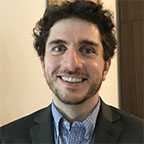
Dr Jean-Loup Samaan is a Senior Research Fellow specialising in Middle East strategic affairs, with a particular focus on Israel–Hizballah conflict and the evolution of the Gulf security system. Prior to joining MEI, he held various positions in the policy sector. He worked as a visiting scholar with the RAND Corporation (2007-2008) and as an advisor at the directorate for strategic affairs of the French Ministry of Defense (2008-2011). He then gained extensive experience in the domain of military education and training, first as a deputy director for the Middle East Faculty of the NATO Defense College (2011-2016) and as an associate professor in strategic studies with the UAE National Defense College (2016-2021).
Dr Samaan has written four books as well as various articles for academic and policy journals. He holds a PhD in political science from University of Paris La Sorbonne (2009) and an accreditation to supervise research (2017) by the doctoral school of Sciences Po, Paris.
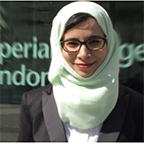
[Moderator] Dr Aisha Al-Sarihi is a research fellow at the National University of Singapore’s Middle East Institute. Dr Al-Sarihi’s areas of research expertise and interest include clean energy policy and climate economics, policies and governance, with a focus on the Arab region. Following her PhD, she was a research officer at the London School of Economics and Political Science’s Middle East Centre. She was also a former visiting scholar at Arab Gulf States Institute in Washington and Georgetown University’s Center for Contemporary Arab Studies. Before joining MEI, Dr Al-Sarihi was a research associate in the Climate and Environment Program at King Abdullah Petroleum Studies and Research Center (KAPSARC). She holds a PhD from the Centre for Environmental Policy at Imperial College London and a MSc and a BSc, with distinction, in environmental science from Sultan Qaboos University.

